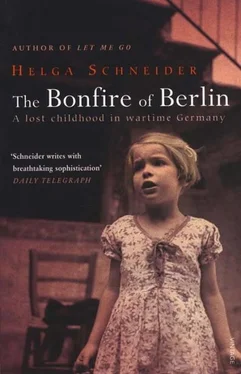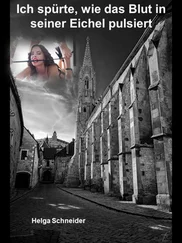Early in the summer of 1942, my father came to Berlin on leave, and Aunt Margarete gave a little party in his honour. The guests included a beautiful young woman called Ursula. At the party Peter and I ate our fill of canapes. Peter threw up twice; I got hiccups. My cousin Eva looked at us as though we were two Cinderellas she was ashamed of. Eva’s vanity made me feel inferior, and I was happy that we hadn’t ended up living with her.
That evening, between one mouthful and the next, I noticed that my father was spending a lot of time with Ursula. She was flirting with him, and he was flirting back! I felt embarrassed and curious at the same time. What was going on?
The only thing that cheered me up when the party came to an end was the hope that my father would never see Ursula again.
During the days that followed, I managed to spend some time with him, but something was wrong. I found him reserved and distant, and began to feel uneasy. He only had three days’ leave; then he returned to the front. I was confused.
My father, slim and handsome, with his high forehead and wavy hair, his thoughtful artist’s expression as he absorbed colours, sounds and emotions◦– my father, with his considered gestures, his low, seductive voice◦– had nothing at all to do with the heroic General of my imagination, so it was difficult for me to reconcile him with my ideal.
Meanwhile the war had been growing more and more intense; as air-raids became more frequent, food supplies dwindled. Grandmother often returned from the shops empty-handed, and when that happened all we had for dinner was a glass of water. To make us forget our hunger, she would tell us fairy-tales or sing us Polish peasant songs.
One morning she began cursing loudly and broke a beautiful gilded coffee-pot. Hurling it to the kitchen floor, she shouted, ‘What an idiot! What a fool!’ My father had written to tell her that he had got engaged to Ursula. After their meeting at Aunt Margarete’s villa, they had corresponded, and now they had decided to marry. My grandmother was beside herself. ‘For heaven’s sake!’ she yelled. ‘Just a year ago your father was devastated when that good-for-nothing mother of yours abandoned him, and now he’s getting ready to marry again! What an idiot! What a fool!’
She couldn’t get used to the idea. She said that Ursula was too young to take on two children who were not her own, and where she had previously spoken of my mother in the most appalling terms, she now lambasted my father for having sought consolation so quickly. All her indignation counted for nothing. The two love-birds had already set a date for their wedding.
When Grandmother realised there was nothing to be done, she packed her suitcase, grabbed my grandfather’s umbrella like a bayonet and set off for Poland, swearing that she never wanted to see her son again, let alone his new bride. Poor Grandmother, she had so looked forward to raising us.
Once Grandmother had gone, I felt lost. She had given us love and joy and, in spite of the war, a sense of security. I was inconsolable and hated Aunt Margarete for bringing my father and Ursula together. We were parked once more at the Tempelhof villa to allow the newlyweds to spend a brief honeymoon in Ursula’s rented flat in Friedrichsruher Strasse in Berlin-Steglitz. I tried to suppress the pain of separation from my grandmother by filling myself up with food. I ate and threw up while Eva looked on in disgust.
It was September. Life at the villa continued as usual. The deaf-mute gardener went on pruning the hedges, and the war seemed only to concern people unfortunate enough to live beyond the big gate capped by the family crest.
Eva was unbearable. Possessive of her dolls, she would not let me touch them under any circumstances. Apart from that, she affected such exaggerated aristocratic manners that I laughed until I was fit to burst.
Aunt Margarete was tall, slim, austere and very beautiful. She had magnificent red hair and splendid skin, white and transparent, with a scattering of pale freckles. She was extremely elegant and wore hats with little veils. When she kissed us goodnight, I could smell a faint perfume that lingered in the room until morning. Three years later, sad to say, she would kill herself with Veronal. I never knew why. My grandmother was given to understand that her daughter had died of pneumonia.
Peter was a terrible child and kept everyone on edge. On two occasions he threatened to throw himself into the empty swimming-pool, and on another he swallowed a little chocolate made of porcelain which gave him a terrible stomachache. Not a day went by when he wasn’t up to some mischief or other.
After this short honeymoon, my father returned to the front, and we went to live with our stepmother in Friedrichsruher Strasse. I was troubled and anxious. The war was worsening rapidly. Air-raids were becoming more frequent and intense, and Ursula complained of the lack of safety in our cellar. On top of that, it was becoming increasingly difficult to find provisions: rationing was not working, and all the shops were empty. You couldn’t find as much as a ball of thread. Old people were dying because of the growing scarcity of food and medicines, particularly those for serious illnesses.
At first Aunt Margarete would send her chauffeur over with a food parcel every now and again, but soon she stopped doing that: even at the villa, things weren’t going as well as they had been. Ursula maintained her youthful and carefree appearance despite the fact that she was growing thinner before our eyes. She had beautiful ash-blonde hair and eyes bluer than Peter’s! My brother would sniff her shoes or kiss her on the chin, and she would laugh and pinch his bottom. In the wink of an eye he had begun to call her Mutti, something I was incapable of doing. The word stuck in my throat. I could say Wutti, or Lutti, or Butti, but Mutti was impossible. This was the first in a long series of difficulties.
I soon came to realise that Ursula employed a double standard when dealing with Peter and with me. Whenever he did something wrong, she found an excuse, as often as not his tender age. When I did something wrong, she would declare that I was my mother’s daughter. She criticised Grandmother’s way of raising us, saying it was too permissive. I didn’t agree; Grandmother had been anything but permissive. Maternal and fair but never weak.
Some of Ursula’s attitudes alarmed me. If I did something wrong, I would stammer, ‘But I thought.. she would interrupt me, shouting, ‘You’re not supposed to think, you’re supposed to obey!’ My blood would go cold. Obeying without thinking: I couldn’t accept such an order from anyone!
She couldn’t bear to be contradicted, either. And when I stood my ground, she punished me. Blind German submission was an absolute for her.
Her chosen place of punishment was the study where my father kept his things: his books, his typewriter, his canvases and his paints. In time I came to hate that studio, filled though it was with traces of him. Apart from being locked in that room, I was given other punishments as well, some of which were truly oppressive. For example, Ursula demanded that I pick out the fluff from the precious Persian carpet she had brought as part of her dowry; she made me stay on my hands and knees until even the tiniest hair was gone. Sometimes I had to continue until the dust gave me a coughing fit.
Another thing Ursula wouldn’t put up with was my innocent lie about my father the General. One day she caught me repeating it to Frau Gerlinde, a friend of hers who lived on the same floor and who sometimes dropped in for a chat. My stepmother had gone to fetch Frau Gerlinde a glass of water, and as she came back into the room she caught me telling my fairytale. She interrupted me roughly, shouting, ‘That fib again! You really are incorrigible! You’re just like your mother, a fake and a liar!’ Then she announced in an authoritarian voice, ‘Your-father-is-in-the-anti-aircraft-division, say “anti-aircraft” after me, foolish girl!’
Читать дальше












